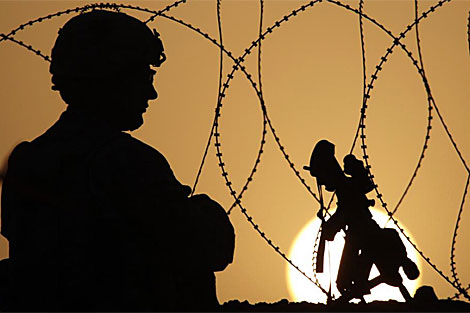
Since some time ago, analysts have been warning about the toll the huge effort in Afghanistan and Iraq will take on the U.S. Army. When combined, these two wars have already lasted 15 years. The data released this week about the number of suicides among U.S. troops confirm the worst predictions. In June alone, 32 soldiers committed suicide, the highest number ever for the U.S. Army. Of them, 21 were active soldiers and 11 were in the reserves.
Including these last suicides, 145 military men have killed themselves during the first six months of this year already. This number is also a new high semiannual record, exceeding the 130 deaths registered during the second half of 2009, the highest number in the Army so far. In 2009, 244 cases of possible suicides occurred. Therefore, this seems to be a worsening problem with every day that goes by.
The highest authorities at the Pentagon are totally aware of it and, over the course of the last years, have launched several programs to erase the stigma related to psychological problems stemming from the anxiety suffered by many soldiers on the battlefield.
If not treated by specialists, these kinds of mental disorders, of which post-traumatic stress disorder is the most common, may lead to suicide.
Out of the 32 soldiers who took their own lives, 22 had participated in combats recently, and 10 of them had been sent to Afghanistan or Iraq between two and four times. “The hypothesis is the same that many have heard me say before: continued stress on the force,” said Col. Christopher Philbrick, director of the Army Suicide Prevention Task Force.
The last effort in the Pentagon to raise the awareness of the troops about this matter has been the preparation of a video in which several soldiers tell their first person accounts of attempted suicide. The video is titled “Shoulder to Shoulder: I Will Never Quit on Life.”
“I put the rifle up to my chin. I put it on semi-automatic, and I pulled the trigger,” Joseph Saunders explains before the camera. He is a soldier going through a depression because of his divorce.
The rifle didn’t fire, and his life was spared thanks to his colleague’s intervention, who noticed the tough times he was going through. “He said, ‘Yes, I took your firing pin. I took it last night. You were worrying me,’” he tells in the video.
For the first time, a video like this collects the testimonials from actual soldiers to cause a greater impact among the military men in service. In previous videos, it was done by actors. “I lay on the floor of my bedroom while my wife pleaded with me not to take my life. She said, ‘If you do this, who benefits?’” another soldier explains.
As experts state, maybe years need to go by until the Pentagon’s efforts are felt and the stigma of seeking help for depression disappears, since changes in cultural patterns that are so deeply rooted need time.

Leave a Reply
You must be logged in to post a comment.